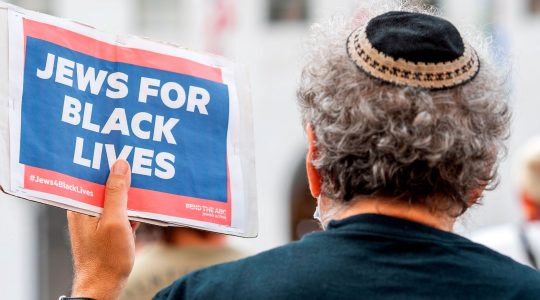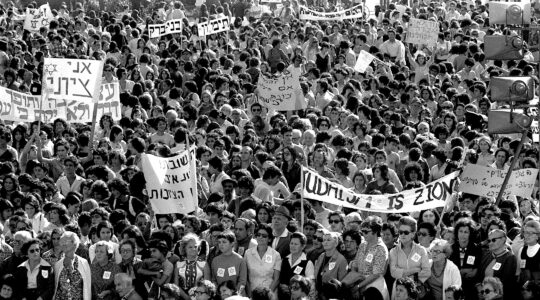The showdown over a controversial conversion bill in the Knesset will likely be averted for the moment. But any sigh of relief you may hear around the Jewish world is premature.
The larger issue — squaring the circle of maintaining standards of Orthodox religious law in Israel without further alienating the majority of world Jewry — is not going away. And neither is the ill will created among the majority of Jews in this country by the attempt to pass the bill, however well intended it may have been.
True, the latest controversy over the legislation proposed by Knesset Member David Rotem of the Yisrael Beiteinu party had little to do with American Jews. It was motivated by a vital concern about easing conversion conditions for hundreds of thousands of Russian immigrants living in Israel. But it created a perfect storm, stirring up a variety of conflicts that had been simmering under the surface.
Among the elements: the fact that if unchecked, the tens of thousands of non-Jews under the age of 18 and living as otherwise full members of Israeli society would soon create a major intermarriage crisis that could eclipse ours in America.
When they seek to marry, these young people will be falling in love with fellow Israelis with whom they attend university, serve in the army or sit next to at work. Unless some solution is found to the conversion conundrum — the current insistence by the Chief Rabbinate that as a precondition for conversion, the candidate pledge in advance to keep all of the mitzvot — Israeli society will become even more fragmented and divided.
Which brings us to the splits between the religious and the secular, and — even within Orthodoxy — the Religious Zionists and the haredim, or fervently Orthodox. The Chief Rabbinate was established as the bastion of the Religious Zionists, who are seen as more modern and tolerant in their interpretation of halacha, or Jewish law. But the haredim essentially control the Chief Rabbinate today and have made the conditions for conversion more stringent so as not to dilute halacha, or Jewish law, as they interpret it.
The fact that a matter of religious identity and interpretation — in effect, who is a Jew — could be decided in the Knesset, the secular parliament, points to another troubling characteristic of Israeli society: the mixing, rather than separation, of church (or, more accurately, religion) and state.
The tragic irony is that the religious parties, which tend to focus primarily on securing funding for their schools and activities, and the Chief Rabbinate, whose rulings have grown increasingly narrow and strict, have done more to distance Israelis from their Judaism than draw them closer.
But religion and state continue to commingle in Israeli life, and that is just a reality, as is the fact that so many major decisions on so many key issues from national security to deciding who is a Jew come down to domestic politics, like the conversion bill itself.
Consider: The proponent of the bill is David Rotem, whose party, Yisrael Beiteinu, is led by Avigdor Lieberman and is supported primarily by Russian immigrants. Lieberman, the thuggish foreign minister from the former Soviet Union who serves as a kind of anti-diplomat, is a polarizing political figure whose blunt statements and outspoken positions on the Arab-Israeli conflict make liberals cringe but gain support from rightists who consider Prime Minister Benjamin Netanyahu too malleable.
Lieberman’s party finished third in the last national election, behind Tzipi Livni’s Kadima party and Netanyahu’s Likud. As a result, Lieberman parlayed his political clout into the key post of foreign minister, and he plays a pivotal role in helping the prime minister hold his coalition together.
Support the New York Jewish Week
Our nonprofit newsroom depends on readers like you. Make a donation now to support independent Jewish journalism in New York.
But the two men, who know each other well — Lieberman worked for Netanyahu during his first tenure as prime minister — are more rivals than colleagues.
Yisrael Beiteinu pledged to make the conversion process more accessible for its constituents, and that is why Rotem has been pushing hard for the legislation. But the bill’s benefits — namely, decentralizing the procedure and allowing city rabbis to do conversions — has been offset by Rotem’s giving in to religious party demands that the Chief Rabbinate be the final authority on such matters. (At present the law is fuzzy enough that the Chief Rabbinate is not involved with state recognition of converts.)
That’s why non-Orthodox Jews in the U.S. are so upset, saying such legislation could keep their conversions from being recognized in the future.
Netanyahu was sympathetic to the effort to speed up and expand the conversion process. But given the current bill, which offers a micro solution to an enormous problem — and infuriates influential American Jews, for good measure — the prime minister has spoken out in opposition.
This may be a rare position taken out of principle, or it could be a response to pressure from diaspora Jewry. But it is risky because if Yisrael Beiteinu pulls out of the coalition over this, the government could fall.
What makes all of this strife more than a shame is that it is needless, and damaging.
Young American Jews, already ambivalent about the Israel they see in the headlines, will only be alienated further by any Knesset legislation that appears to marginalize them.
And as for a solution, we don’t have to reinvent the conversion wheel. A dozen years ago the Ne’eman Commission, created for the same purpose of streamlining the conversion process, resulted in a conversion institute made up of faculty from the various religious streams, where the actual conversion was approved by the Orthodox courts.
But only a few hundred immigrants are being converted annually, in part because the Chief Rabbinate has been more of an obstacle than a supporter.
By contrast, in dealing with the Ethiopian influx former Sephardic Chief Rabbi Ovadia Yosef took a welcoming attitude and made conversion a national project, with greater success.
The solutions, then, are available; what’s required is the willpower of national and religious leaders to translate the empty rhetoric of Jewish unity and peoplehood into reality, strengthening and increasing our ranks rather than driving us further apart.
E-mail: Gary@jewishweek.org
Support the New York Jewish Week
Our nonprofit newsroom depends on readers like you. Make a donation now to support independent Jewish journalism in New York.





